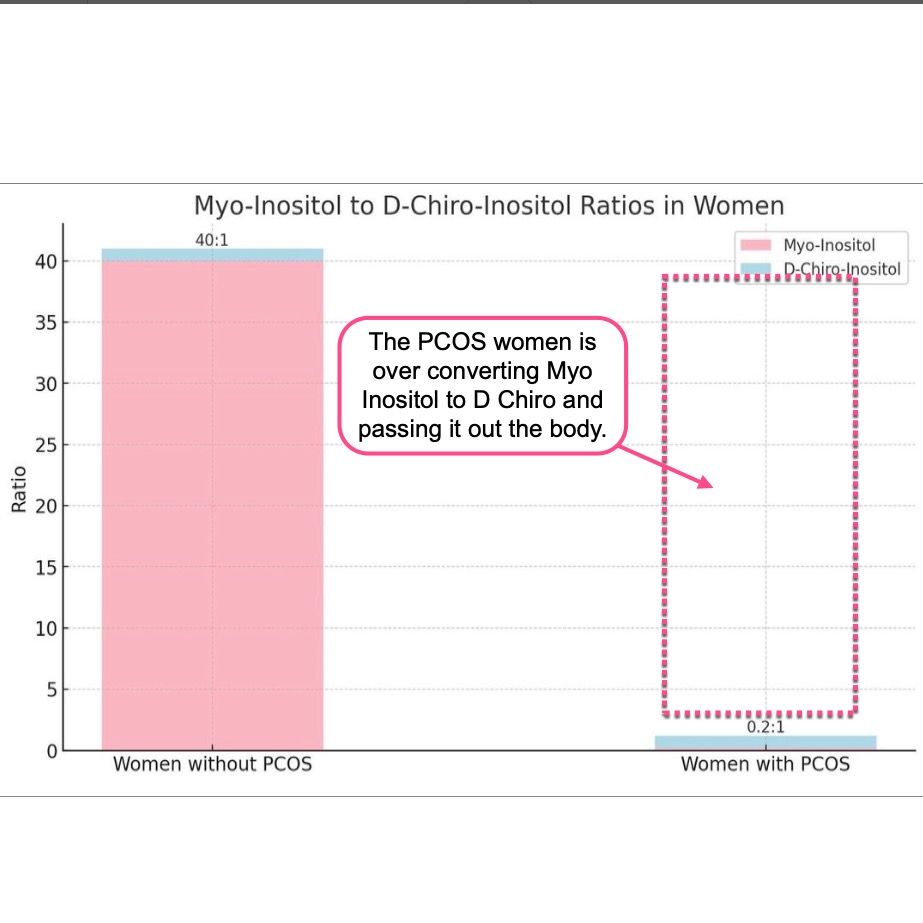Understanding the female body can be confusing. Every month, and often every day, a woman’s body cycles through several hormonal changes. While it may seem like these changes are out of our control, supplements like Inositol can regulate these changes.
Inositol is one supplement that can balance out our body’s hormones and chemical processes. Inositol is a sugar that regulates the body’s ability to receive cell signals. It can affect both female reproductive cells and cells that control non-reproductive hormones like insulin.
There are several types of Inositol that occur naturally in the body and some that we consume. However, the two most popular types are Myo-Inositol and D Chiro Inositol.
Each type of Inositol targets different cells. For example,
- Myo-Inositol targets cells that function in the reproductive system,
- D-Chiro more accurately targets insulin resistance.
Taking a combination of the two can support a range of conditions including PCOS and insulin resistance. The primary benefit of 40:1 blends are a faster response to pcos symptoms like acne and hirtuisim. It take a few weeks for the body to convert pure myo-inositol to the amount of D-Chiro it requires in the kidneys.
If you have PCOS however, the problem is that your body converts Myo-Inositol much more effectively and reduces your concentration of Myo-Inositol from the ovarian 40:1 ratio (MI:DCI) to as little as 0.2:1 MI:DCI.

Unfortunately, if you’re trying to get pregnant, then too much D-Chiro can actually inhibit your body’s fertility chances. So if you want to take Inositol for fertility, then consider a pure Myo-inositol.
If you’re unsure what you need or where to start, here’s the gist on D-Chiro and how too much of it can actually harm your fertility rates.
Myo-Inositol v D Chiro Inositol
Inositol is a sugar that is found in the body and is regularly consumed in our daily diet.
Both Myo-Inositol and D-Chiro in prescription dosages have been shown to improve the effects of PCOS or polycystic ovarian syndrome in individuals. Therapeutic dosages of Myo-Inositol and D-Chiro individually, as well as in combination, showed positive results at improving menstrual regularity, endocrine parameters, metabolic parameters, insulin resistance, and in reducing acne in young and overweight PCOS patients.
Individuals without PCOS are able to take Myo-Inositol and D-Chiro to regulate a number of hormonal imbalances. Taken together, and at appropriate dosages, Myo-Inositol can improve ovarian function and metabolism in individuals with PCOS.
For example, Myo-Inositol is best if it aims to control the metabolic profile, such as regulating insulin resistance. Comparatively, D-Chiro better reduces hyperandrogenism qualities, such as acne, hirsutism, unregulated menstruation, and androgen production.
Inositol for Fertility
In terms of fertility, you might think that because both can positively affect the ovarian cycle, then you can take both. However, it is necessary to take a closer look.
D-Chiro might positively affect ovarian function by regulating ovarian cycles and egg production. In a person with hyperandrogenism, this can mean getting their cycle back on track to occur every month (on average). A person who has hyperandrogenism might have a period every three months. This means that they experience a much longer ovarian cycle and an abnormal menstrual cycle, in addition to other symptoms like hirsutism and acne.
D-Chiro will regulate the ovarian cycle in individuals with PCOS but it will affect PCOS symptoms more broadly, with less of a focus on fertility enhancements. Comparatively, Myo-Inositol is more effective at targeting the metabolic profile, which might induce ovarian function and regulate the ovarian cycle.
If you want to take Inositol for fertility and you don’t have PCOS, then it is likely that your doctor will recommend a normal dose of 2 grams in addition to 400 micrograms of folic acid twice daily. They might also recommend a small combination of D-chiro-inositol (with a ratio of 40 Myo-Inositol to 1 D-Chiro).
If you are overweight or obese, have PCOS, have poor blood pressure, or cardiovascular issues then your doctor is likely to suggest myo inositol or 40:1 Myo-Inositol to D-Chiro. Higher levels of D-Chiro might worsen oocyte (egg) quality, so be sure to consult your doctor when considering Inositol doses for fertility.
Please note that your body converts Myo-Inositol to D-Çhiro naturally to meet its needs. It is only required if you have a condition that prevents this natural conversion process that you will need to supplement D-Chiro. It is not recommended to take D-Chiro inositol alone for 3 reasons.
- High doses of D-chiro inositol per day are detrmental for ovaries and oocyte maturation
- The body converts myo-inositol in a unidirectional fashion. D-Chiro Inositol cannot be converted back to Myo-Inositol.
- Myo-Inositol is correlated with many insulin resistance conditions.
Things to Consider When Taking Inositol for Fertility
If you are trying to get pregnant and it is not happening, then you might be considering other methods for improving fertility. Taking Inositol should be one part of a process for overall fertility improvement and should not be relied upon to change fertility levels on its own.
When trying to conceive, be sure that you are taking the right amount of vitamins. Your vitamin D level is important before and during pregnancy, as well as vitamins like folic acid. You should also be exercising regularly, drinking plenty of water, eating a healthy diet, and cutting back on problematic substances like alcohol and smoking.
If you have PCOS and you are trying to get pregnant, then your doctor might recommend Inositol in addition to other medications. Taking Myo-Inositol for 12 months might increase your chances of getting pregnant but it might also need to be taken in conjunction with in vitro fertilization (IVF) procedures.
Finding the Right Inositol Supplement for You
If you are experiencing infertility, then you may be understandably frustrated. Know that no matter what you are going through, it is normal and anyone can experience issues with conception or infertility. This is why we have trusted Myo-Inositol to help with infertility.
An Inositol supplement that is all-natural and organic will give your body the balance that it needs. Since you will be using this supplement for larger, therapeutic purposes, then you want to source the powder version as opposed to the pill version.
Additionally, speak with your doctor to make sure that the dosage of Inositol is right for you. While there are no major negative side effects when taking Inositol, you may experience mild side effects like dizziness, lightheadedness, and nausea.
If this is the case for you then take 1g/day in week 1, 2g/day in week 2 and gradually increase as your body adjusts.
Summary Table
| Application | Myo-Inositol (MI) | D-Chiro Inositol (DCI) |
| Function | Regulates glucose uptake and follicle stimulating hormone (FSH) signaling. Converts a small portion to DCI through the epimerase enzyme process. | Devoted to the insulin-mediated androgen production. |
| Helps with Reproductive Health & Fertility | ✅ | ❌* |
| Improves Metabolism | ✅ | ❌ |
| Improves ovarian function | ✅ | ❌ |
| Reduce Risk Of Preterm Birth | ✅ | ❌ |
| Helps with Insulin Resistance | ✅ | ✅ |
| Improves effects of PCOS | ✅ | ✅ |
| Menstrual regularity | ✅ | ✅ |
| Endocrine parameters | ✅ | ✅ |
| Reducing acne | ✅ | ✅ |
| Reduces hirsutism | ✅ | ✅ |
| Unregulated menstruation | ✅ | ✅ |
| Androgen production | ✅ | ✅ |
- Can have a negative effect on oocyte production and quality.
-
Sale!
Natural Myo Inositol for Fertility & Pregnancy
$ 36.50 – $ 204.00 Select options This product has multiple variants. The options may be chosen on the product page -
Morlife Collagen Protein Water – 400g – Tropical or Berry
$ 54.95 Select options This product has multiple variants. The options may be chosen on the product page -
Naturobest Preconception Multi For Men
$ 49.99 Read more
References
Formuso, C., Stracquadanio, M., & Ciotta, L. (2015). Myo-inositol vs. D-chiro inositol in PCOS treatment. Minerva Ginecologica, 67(4), 321-325. Retrieved Nov 26, 2020.
Inositol Australia. (2020). Inositol Powder For Fertility. Retrieved Nov 26, 2020.
Papaleo, E., Unfer, V., Baillargeon, J. P., De Santis, L., Fusi, F., Brigante, C., … & Ferrari, A. (2007). Myo-inositol in patients with polycystic ovary syndrome: a novel method for ovulation induction. Gynecological Endocrinology, 23(12), 700-703. Retrieved Nov 26, 2020.
Pizzo, A., Laganà, A. S., & Barbaro, L. (2014). Comparison between effects of myo-inositol and d-chiro-inositol on ovarian function and metabolic factors in women with PCOS. Gynecological Endocrinology, 30(3), 205-208. Retrieved Nov 26, 2020.
Reproductive Science Center. (2015). Myo-Inositol for Fertility Treatment. Retrieved Nov 25, 2020.
WedbMD. (2020). Inositol: Uses, Side Effects, Interactions, Dosage, and Warning. Retrieved Nov 26, 2020.
Roseff, S. & Montenegro M, (2020) Inositol Treatment for PCOS Should Be Science-Based and Not Arbitrary. International Journal of Endocrinology Volume 2020 Article 6461254 Retrieved Nov 26, 2020
Results from the International Consensus Conference on Myo-inositol and d-chiro-inositol in Obstetrics and Gynecology: the link between metabolic syndrome and PCOS https://pubmed.ncbi.nlm.nih.gov/26479434/
Bye-bye chiro-inositol – myo-inositol: true progress in the treatment of polycystic ovary syndrome and ovulation induction https://pubmed.ncbi.nlm.nih.gov/22165685/
Myo-inositol vs. D-chiro inositol in PCOS treatment – https://pubmed.ncbi.nlm.nih.gov/25670222
Reflections on inositol(s) for PCOS therapy: steps toward success – https://pubmed.ncbi.nlm.nih.gov/26177098/
The inositols and polycystic ovary syndrome – https://www.ncbi.nlm.nih.gov/pmc/articles/PMC5040057/






